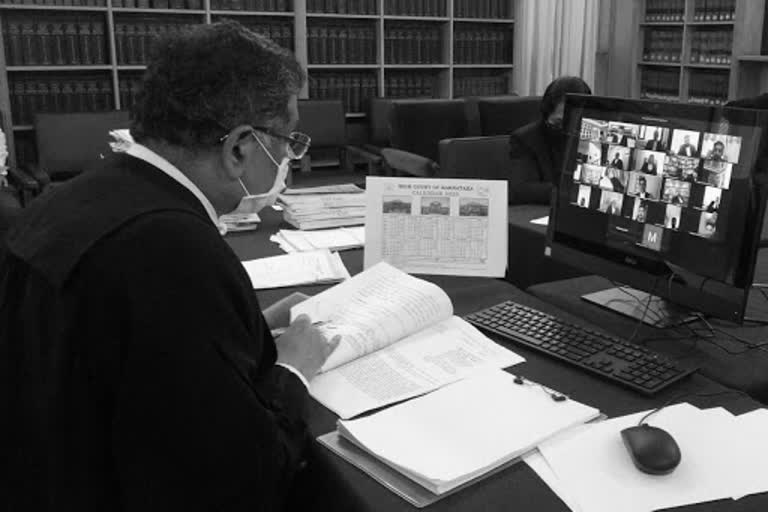New Delhi: The Parliamentary standing committee published its 103rd report on virtual courts where it has suggested that virtual hearings be continued even after the COVID-19 pandemic is over as it can reduce the pendency of cases 'which have been clogging the wheels of justice for decades'.
"To continue with the functioning of virtual courts in the courts even during the non-pandemic time, the committee feels that the present system should be allowed to continue on an experimental basis with the consent of all parties for certain categories of cases like appeals, final hearings where the physical presence of the parties/counsels is not required and online virtual hearing is sufficient," read the report.
For a complex case involving the interpretation of law, facts etc, the committee has said that a hybrid model can be adopted wherein hearing can be conducted in physical courts but other things like summons, vakalatnamas, etc, can be digitised.
Read:| E-filing paving way for virtual courts, no going back: CJI
It has recommended using virtual medium even in various tribunals like TDSAT, IPAB, NCLAT, etc, as it will cut down the cost, reduce crowds in the court and increase the efficiency of the cases without being unnecessarily adjourned.
Noting the shortcomings in conducting virtual hearings, the committee asked the Ministry of Electronics and Information Technology to employ globally tried tools such as immersive telepresence technology, augmented reality systems etc. so that it seems more lifelike and engaging.
For the e-Courts Integrated Mission mode project, the committee expressed its unhappiness and remarked that it is processing at a 'tortoise's pace' and without proper infrastructure virtual hearings are impossible.
E-Courts Integrated Mission mode project is a pan India e-governance project being implemented in High courts and district /subordinate courts. The project has been conceptualised based on National Policy and Action Plan for implementation of Information and communication technology in the Indian judiciary by the e-committee of the Supreme Court. The project is monitored and funded by the Department of Justice and implemented by National Informatics Centre (NIC).
Read:| Supreme Court issues SOPs for virtual courts proceedings
The committee has strongly recommended the Department of Justice to examine the situation and ensure that measures are taken to achieve the targets.
In a slew of recommendations, the committee has asked the government to step up efforts to provide WAN connectivity, superior quality video conferencing facilities, roping in the private sector to improve the service quality, introduce computer course in law to train the students for online systems etc.
It has included in the report various shortcomings like digital divide especially in rural India, technological competence, poor connectivity, data privacy, security etc and has suggested measure to the concerned Ministries. One of the major recommendations includes developing indigenous software and rope in private entities to develop artificial intelligence systems capable of supporting bulk documentation, the remote location of parties and sophisticated use of graphics.
The courts have been hearing cases online since the lockdown was imposed in wake of COVID-19 and no date has been announced for the resumption of physical hearings yet. However, the courts are mulling over the idea to restart physical hearings in certain cases.
Read:| BCI to provide videoconferencing facility to lawyers to appear before virtual courts



